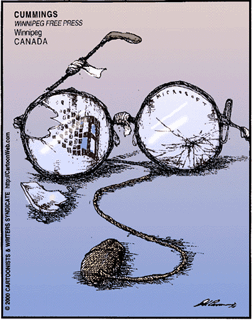
Robert W. Tracinski
http://www.jewishworldreview.com -- FIRST the good news: The new administration's officials in the Department of Justice have decided not to murder the Microsoft Corporation and carve up its corpse. Now the bad news: They have chosen the more humane option of slow torture.
The Justice Department's new policy is certainly better -- or, to be more accurate, less bad -- than the demands made by the Clinton administration. The old Justice Department wanted to hack Microsoft to pieces, splitting it into two or three companies and placing its Windows operating system under the control of court-appointed regulators and envious competitors. Even worse, they wanted to enforce the stagnation of Windows, opposing the addition of new features and outlawing the "bundling" of the operating system with extra features like Web browsers.
When you consider the central role Microsoft has in the computing industry, with its operating system running on virtually every PC, dismembering Microsoft means reorganizing the whole industry. You can imagine the traumatic effect of such a radical, government-imposed restructuring, combined with a decree to stop all improvements to Windows. Wall Street could imagine it, too, which helped trigger last year's tech stock crash.
But now the Justice Department has backed off. In addition to dropping the demand to break up Microsoft, the Bush folks have also dropped any objections to "bundling." This would seem to free Microsoft to introduce new features without fear of reprisal, starting with the release of Windows XP later this year. Perhaps more important, this new stance will also clear the way for a quick settlement of the case, helping to lift the cloud of uncertainty that hangs over the industry.
But that cloud will only be thinned, not lifted. The Justice Department has moderated its Clinton-era regulatory bloodlust -- but it is still pursuing the intrusion of the antitrust laws into the free market. That means that Microsoft faces, as the alternative to death and dismemberment, the prospect of slow torture by capricious and unpredictable judicial rulings.
 |
To get an idea of the arbitrary quality of these antitrust restrictions, note that the part of the case that has just been dropped -- the campaign against "bundling" -- was once the entirety of the case. It was only relatively late in the process that former antitrust chief Joel Klein decided to throw in everything but the kitchen sink, attacking Microsoft for practically all of its business practices. Yet now that bundling is -- at least for the moment -- no longer considered a crime, Microsoft still faces regulation on this plethora of additional, vaguely defined charges. And more: Microsoft faces the prospect that any future business decision could, without warning, be branded a violation of the settlement, triggering a whole new round of court attacks. Then, after all this wrangling with the Justice Department, there is still another shoe waiting to drop: private antitrust suits by competitors seeking to loot Microsoft's treasury by claiming treble damages under the antitrust laws.
Microsoft is suffering from a bad case of cancer, and while the original tumor may be removed, the disease has already metastasized. The cancer is the scourge of government regulation -- and the victim it threatens is not just Microsoft but the entire computer industry.
Prior to the Microsoft prosecution, the technology sector flourished under a kind of benign neglect. Legislators, regulators and antitrust enforcers were baffled by the novelty of the industry. Everything seemed so new, so technical, so complex -- and so obviously competitive -- that government officials were afraid to interfere with it. And, perhaps more to the point, they also feared widespread resistance from the industry's free-wheeling entrepreneurs, who had a reputation as avid free-marketers.
Now the Microsoft case has broken down those barriers. It has set a precedent for regulators and litigators, showing them that they can successfully bring the whole weight of government intervention to bear on the computer industry. Even if they cannot impose a corporate death penalty, they can inflict enough harm to bring even the strongest and proudest firms under submission. And, most ominous of all, they now know that they can do it to the cheers and encouragement of envious, short-sighted competitors.
The computer industry has been the fastest growing part of the economy and the engine of the past decade's economic growth. But the Microsoft case has now unleashed the unpredictable threats and debilitating red tape of antitrust regulation. Think about that the next time you hear politicians talking about what government can do to revive the ailing
Comment on JWR contributor Robert W. Tracinski's column by clicking here.
09/05/01: The UN Conference of Racists
08/28/01: Waging war on profits and lives
08/20/01: The Bizarro-World War
08/08/01: The death toll of environmentalism
07/31/01: Where does America stand?
07/25/01: Barbarians at the G8
07/17/01: The carrot and the carrot
07/11/01: The real Brave New World
07/03/01: The child-manipulators
06/19/01: The scientist trap
06/11/01: The National Academy of Dubious Science

